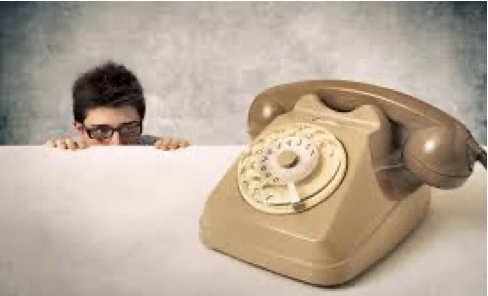01/06/23
Not picking up the phone is not as unusual as it may seem.
Click HERE to download the Weekly English Practice as a PDF.
Useful Vocabulary
daunting: in a way that is intimidating and feels like a difficult task
disapproval: an expression of unfavourable opinion
overwhelming: when something is very intense and makes somebody feel worried or stressed out
gazing: look steadily and intently, especially in admiration, surprise or thought
straight away: immediately, right away
awkward: causing or feeling uneasy, embarrassment or inconvenience
pattern: a particular repeated way in which something is done, is organised, or happens
Listen to the audio and read the text.
Phone call anxiety
Talking on the phone can be daunting because we’re limited to just the sounds of our voices. In the absence of all other social cues— including gestures, body language and eye contact—we can often feel self-conscious of the sound of our own voices and our choice of words.
Thanks to technology, we can often go days, weeks or even months without directly speaking to others on the phone. One study found anxious people prefer texting over phone calls, rating it a superior medium for expressive and intimate contact.
Some people opt for texting because it gives them time to think about the wording of their messages, providing the opportunity to be informal. In some cases, they develop a different personality separate and in contrast to their real-life, more reticent, self.
Research also suggests phone call anxiety is related to a preoccupation with what the other person thinks of them. By eliminating the immediate reaction of others in spoken conversations, text messaging may offer those with phone call anxiety a way of making social contact without the fear of rejection or disapproval.
Another reason phone calls can sometimes feel overwhelming is the pressure that comes with being someone else’s focus. In face-to- face conversations, we have several distractions in our environment; like gazing out of the window or, ironically, checking the missed call notifications on our phones. This can make the interaction feel more casual and the conversation flow naturally. On a call, there are no external distractions, so it can feel like the spotlight is on us to answer questions straight away.
Pauses can feel extremely uncomfortable too. In person, you can see when someone is distracted or thinking but on the phone brief silences can feel awkward. We’re also becoming accustomed to being able to review emails, texts and social media posts before hitting the send button, so a phone conversation can feel impulsive and risky.
It’s easy to put off or completely avoid calls when you’re feeling anxious, but the more you procrastinate, the worse the anxiety is likely to get. The good news is you don’t need to suffer in silence, or over text messages. There are several useful techniques that may help you break the pattern.
One of the most effective ways to overcome phone call anxiety is to expose yourself to more phone calls. The more you do it, the less overwhelming it becomes. It’s also likely that your phone call anxiety is linked to a lack of experience. The more practice you have, the less anxious and more confident you’ll feel.
Adapted from this article by ECP coach Darren Lynch
Let’s chat about that
- Do you ever feel uncomfortable having to make a phone call or answer a phone call?
- Do you prefer to make a phone call or send a text message?
- Would you say millennials suffer more from phone anxiety than baby boomers? Give reasons for your answer.
- Having read the article, would you be more or less likely to make a call considering that the person on the other end may be suffering from phone anxiety?
- How do you feel about making a call in English?

